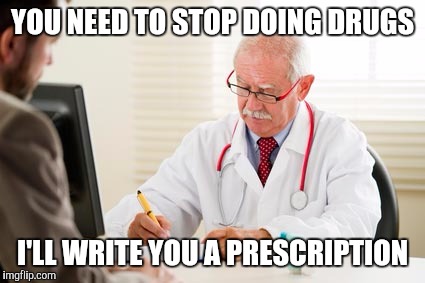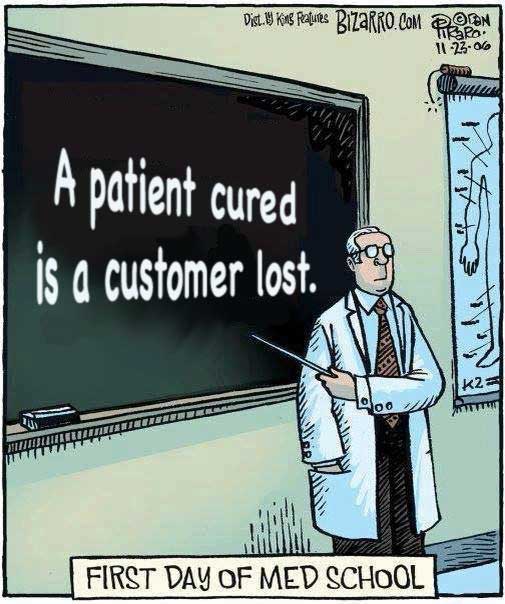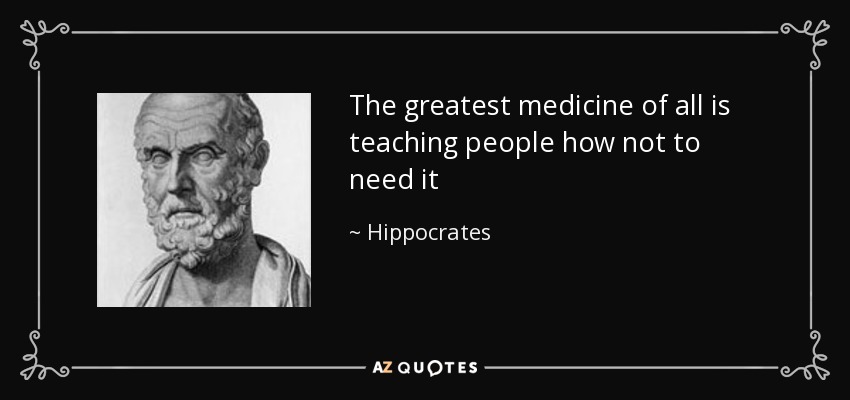Why So Soon?
Aug 05, 2018
There've been a few discussions recently around the topic of over-treatment in healthcare and physiotherapy. This is a good thing, as over-treating patients is something that is not often recognised and something that is discussed even less. But why does over-treatment occur in physio? How do we know when it is happening, and what can we do about it?
I see day in and day out many healthcare professionals over-treating many things that just don't need it, often because the condition has a favourable natural history and a very high chance of getting better on its own without any interference or meddling.
However, many healthcare professionals do not like not treating patients, am I'm not sure if that double negative sentence makes it a positive? Anyway healthcare professionals like to treat, and the fancier the treatment, often the better.
Now I don't blame healthcare professionals for wanting to treat their patients, it is after all, why most of us go into this line of work, to help others in pain and distress. Trying to help patients is in clinicians nature, as well as in their training, and so this is always going to be hard to go against.
Pills and surgery
Yet despite their nature and training healthcare professionals need to be just as aware of when they don't need to treat as they do. All clinicians need to recognise when their interventions and treatments could be doing more harm than good. But this is easier said than done.
For example, our medical colleagues know you don't give every patient in pain painkillers, or treat a viral infection with antibiotics, doing so is not only ineffective but also harmful as it can increase the risk of antibiotic resistance. Also, our surgical colleagues know that they can't and shouldn't be operating on everyone they see, to do so would be a clear sign of over-treatment.

I do recognise that not treating everyone it is a little harder for physios due to their 'treatments', the context and the conditions being different from our medical and surgical colleagues. And also due to the harms and risks of the treatments they provide being far less serious or obvious. But is it really that different for physios than medics and surgeons when it comes to treating?
Should physios treat everyone they see?
Absolutely not, if you are an MSK physiotherapist and you find that you are treating every patient you see, I would argue you are most likely over-treating unless you work in a specific niche area!
As usual, many disagree with me here and think that as physios we should be doing everything we can with everyone we see, even if we can only give some patients short lasting minimal pain relief, it is still better than doing nothing. I disagree.
In my opinion, treating everyone means that out systems get over whelmed and snarled up with the shear weight of people. meaning a lot of more complex and serious stuff that does need treatment gets delayed or over looked due to things that don't need treatment taking up time, staff and other resources.
Also always trying to reduce pain when it's not essential often gets in the way of what we should be doing more. Educating and reassuring patients that pain is unpleasant but normal, can hurt but not harm, and is safe not dangerous. As well as helping them find ways and means for them to cope and self-manage for the long term.
We clearly need to help and assist some patients more than others for lots of different reasons, mostly due to the condition they have, but also their beliefs and attitudes, and their abilities and motivation. Simply put some patients will need more help and assistance than others regardless of the pathology they have.
Those that don't need our time, help, and assistance and have a favourable natural history should be assessed, reassured, given a plan of action, and discharged. However, many feel awkward doing this for a number of reasons.
First as I already mentioned because it is in their nature to try and help, but also because not treating a patient is hard bloody work. Not treating a patient actually requires more time and effort than treating one, but more importantly not treating a patient doesn't get financially or emotionally rewarded very well!

Many patients when they don't get treatment will feel hard done by because it is often perceived as uncaring, cold, and dis-compassionate. Therefore taking the time to clearly AND compassionately explain and educate a patient about HOW and WHY they don't need treatment is both difficult, awkward, challenging, time-consuming and often a thankless task. This is why many don't do it.
How can you avoid over-treating patients?
I have a simple and straightforward method that tries to ensure I am not over treating anyone I see. All this involves is me asking the patient to decide when they want to come back next, not me!
Rarely these days will I make the decision of when a patient should come back for a follow-up session. I will only do this when I have a specific reason to assess or check something such as postoperative wound check, or perhaps a time-constrained change in rehab, only then will I stipulate when the next session is.
By asking other patients to decide when they come back for another appointment means you as the clinician are side-stepping the decision making and letting the patient take control and decide when they should next be seen. This I think is beneficial for a number of reasons.
First, is it puts the patient in control and helps remove the clinician/patient hierarchical barriers, it also allows you an opportunity to evaluate the patient's self-efficacy and their locus of control as well as have a chance to discuss these things with the patient if needed.
For example, when I patient asks me "when should I come back to see you", and I respond with "when do YOU think you need to come back to see me?". Whatever their answer is I will almost always say "really, why so soon?"
Now I say this not to be condescending or a dick, but rather to allow me and the patient to gage their levels of confidence, understanding, and the robustness of the plan we have set in motion. If I have done a good job of improving their confidence and understanding and have a good robust plan in place that they can follow, then really a patient wont need to come back to see me soon if at all.

However, if I have done a poor job at the above or the patient still has lots of concerns, worries, and questions, they will want to come back quickly. This then means I have to do better next session and try to work harder at answering their concerns more effectively and increasing their confidence more so they believe they can manage this independently without me.
My number 1 role as a healthcare professional is to make all patients feel like they don't need to see me as safely, and quickly, and effectively as possible. As Hippocrates says...
"The greatest medicine of all is teaching people how not to need it!"
So there you go, just a little tip you may want to use with some of your patients when it comes to arranging follow up sessions and a neat way to try and avoid over-treating patients. So the next time a patient tells you when they want to come back to see you, why don't you politely ask them "why so soon?" and see where it takes you.
As always thanks for reading!
Adam
Stay connected with new blogs and updates!
Join my mailing list to receive the latest blogs and updates.
Don't worry, your information will not be shared.
I hate SPAM, so I promise I will never sell your information to any third party trying to sell you laser guided acupuncture needles or some other BS.

